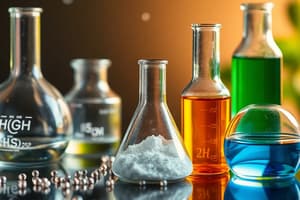Podcast
Questions and Answers
What is the defining characteristic of plasma?
What is the defining characteristic of plasma?
- Low-energy and has definite shape but no definite volume
- Low-energy and has definite volume but no definite shape
- High-energy and has definite volume and shape
- High-energy and lacks definite volume or shape (correct)
Which state of matter has moderate energy and movable molecules?
Which state of matter has moderate energy and movable molecules?
- Solid
- Gas
- Liquid (correct)
- Plasma
What are examples of gases according to the text?
What are examples of gases according to the text?
- The sun and lightning
- Helium and air (correct)
- Mercury and milk
- Neon signs and plasma TVs
What is the most common state of matter in the universe?
What is the most common state of matter in the universe?
According to Kinetic Molecular Theory, what is the relationship between gas pressure and the quantity of gas?
According to Kinetic Molecular Theory, what is the relationship between gas pressure and the quantity of gas?
Which gas law states that the temperature and volume of a gas have a direct relationship?
Which gas law states that the temperature and volume of a gas have a direct relationship?
What is the ideal gas law equation that relates pressure, volume, temperature, and amount of gas?
What is the ideal gas law equation that relates pressure, volume, temperature, and amount of gas?
How can kinetic energy in gases be calculated using the gas constant and temperature?
How can kinetic energy in gases be calculated using the gas constant and temperature?
Which type of property refers to the interactions of matter with other substances during chemical reactions?
Which type of property refers to the interactions of matter with other substances during chemical reactions?
What is an example of a physical property of matter?
What is an example of a physical property of matter?
What occurs when the atoms of matter are rearranged with other substances, altering the chemical composition?
What occurs when the atoms of matter are rearranged with other substances, altering the chemical composition?
What does density represent as a physical property of matter?
What does density represent as a physical property of matter?
What is the maximum density temperature of water?
What is the maximum density temperature of water?
Which type of chemical reaction involves the creation of new substances through chemical processes?
Which type of chemical reaction involves the creation of new substances through chemical processes?
What is the rarest state of matter on Earth?
What is the rarest state of matter on Earth?
Which type of matter has a fixed structure and packs more mass into a given volume than a liquid or gas?
Which type of matter has a fixed structure and packs more mass into a given volume than a liquid or gas?
Which of the following is an example of a physical property of matter?
Which of the following is an example of a physical property of matter?
What happens to the chemical composition of a substance during a phase change?
What happens to the chemical composition of a substance during a phase change?
Which of the following is not a phase change of matter?
Which of the following is not a phase change of matter?
What type of property is length, according to the text?
What type of property is length, according to the text?
Which of the following is a physical property of matter?
Which of the following is a physical property of matter?
What is an example of a phase change that does not affect the chemical composition of a substance?
What is an example of a phase change that does not affect the chemical composition of a substance?
Which property of matter involves changes in state from solid to liquid and vice versa?
Which property of matter involves changes in state from solid to liquid and vice versa?
What type of properties can be determined through visual observation or measurement without changing the substance's chemical composition?
What type of properties can be determined through visual observation or measurement without changing the substance's chemical composition?
Flashcards are hidden until you start studying
Study Notes
Physical and Chemical Properties of Matter
- Solid matter has a fixed structure and packs more mass into a given volume than a liquid or gas, except for water which decreases in density when it freezes.
- Reactivity is a chemical property, involving the ability of matter to interact and create new substances through chemical processes.
- Five types of chemical reactions are combustion, synthesis, decomposition, single replacement, and double replacement.
- Mass is a physical property, measurable using a balance, and influenced by both the amount and density of matter.
- Corrosion is a chemical property where oxygen reacts with the surface atoms of a metal, leading to the destruction of the metal's integrity.
- Understanding physical and chemical properties of matter is crucial in scientific, technical, and daily life applications.
- Matter exists in four states: solid, liquid, gas, and plasma, with plasma being rarer and matter on Earth mostly existing in solid, liquid, or gas form.
- Examples of matter in different states include solid (brick, ice), liquid (water, mercury), gas (water vapor, helium), and plasma (the Sun).
- Solids have high density, a definite shape, and volume, while liquids and gases have less density and take the shape of their container.
- Gold is an example of a metallic solid, maintaining a constant shape and volume due to its fixed molecular structure.
- Water reaches its maximum density at 4 degrees Celsius and freezes solid at 0 degrees Celsius.
- Corrosion can cause significant damage to infrastructure materials such as steel and bridge supports.
Studying That Suits You
Use AI to generate personalized quizzes and flashcards to suit your learning preferences.




